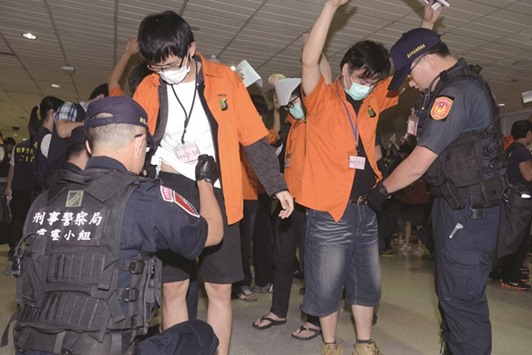Taiwanese fraud rings based all over the world have for years swindled billions of dollars from members of the public through phone scams — now they are the target of an angry China.
As relations sour between Taipei and Beijing, China has insisted that Taiwanese scammers caught abroad are deported to the mainland.
While Taipei has called the move “abduction”, Beijing says it is justified because the majority of the phone fraud victims are mainland Chinese.
In several swoops since April, around 200 Taiwanese fraud suspects have been deported to China from countries including Armenia, Cambodia and Kenya, according to Taiwanese authorities.
The latest incident came yesterday when 21 fraud suspects were deported “against their will” to China by Malaysia, Taiwan’s foreign affairs ministry said.
Previously, suspects would usually have been deported back to Taiwan as part of informal arrangements between crimefighting agencies in China, Taiwan and countries where the fraudsters are operating.
Beijing still sees self-ruling Taiwan as part of its territory and the new wave of deportations are widely seen as a move to pressurise China-sceptic president Tsai Ing-wen — relations between the two sides have grown increasingly frosty since she won the presidency in January.
“Taiwan and China used to jointly investigate fraud cases but it is getting more difficult with the change of ruling party in Taiwan,” said lawmaker Hsu Shu-hua of the opposition Kuomintang, who has proposed tougher fraud laws.
Crimefighters say the current lack of cross-strait cooperation is making it more difficult to tackle the burgeoning networks.
The crime rings involve thousands of citizens from Taiwan and China.
This year more than 10,600 phone fraud cases were recorded up to October, with numbers almost doubling over the past two years due to smartphone app fraud.
Scammers have been hacking into popular messaging app Line posing as the user’s friends to access phone account details, or asking them to buy gift cards.
Fraudsters also make phone calls to victims, posing as police officers to request credit card information which is then used to make purchases, or pretending to be prosecutors demanding access to accounts implicated in money-laundering.
Some victims transfer their entire accounts over to the fake law enforcers who say they need to ringfence the money while an investigation is under way.
China’s Taiwan Affairs Office has accused the swindlers of causing more than $1.5 bn in losses annually on the mainland.
Historic crackdowns when relations were better between China and Taiwan have forced fraudsters further afield, says Chan Chih-wen, an anti-fraud specialist at Taiwan’s Criminal Investigation Bureau (CIB).
Since 2011, more than 2,000 Taiwanese fraud suspects have been arrested in 15 countries.
While cross-strait politics may now make them harder to catch, some observers say malaise among Taiwanese youth is also to blame.
With a stagnating economy many young people in Taiwan are disillusioned about a lack of jobs.
Zhang Xue-hai, head of a civil group assisting jailed Taiwanese nationals in Thailand, said his cases are young people duped into joining fraud rings, which then confiscate their passports and mobile phones.
“They are twenty-somethings who can’t find work after graduating.
They were introduced by friends and went to Thailand thinking they were getting normal jobs,” said Zhang of the Taiwan Association for Legal Aid.
Police say fraudsters typically operate in small groups and recruit from acquaintances, mainly the young and jobless.
While some may be tricked into involvement, others go into it with their eyes open.
One young Taiwanese suspect deported from Kenya to Beijing in April said he had simply done it for the money.
“I just want to help my child to live a better life,” said Liu Tai-ting, 27, in a confession aired on Taiwanese television.
He said he made around $8,000 in Kenya and wired the money to his ex-wife.
Legal experts say scammers often receive sentences of under a year when apprehended in Taiwan.
“The profit far outweighs the punishment and they will do it again and again,” said Tsai Tyan-muh, a criminologist at the Central Police University.
The possibility of being sent to China, where fraudsters face a maximum life sentence, may become an extra deterrent.

This picture released by Taiwan’s Criminal Investigation Bureau shows policemen checking Taiwanese fraud suspects as they arrive the Taoyuan International airport.
